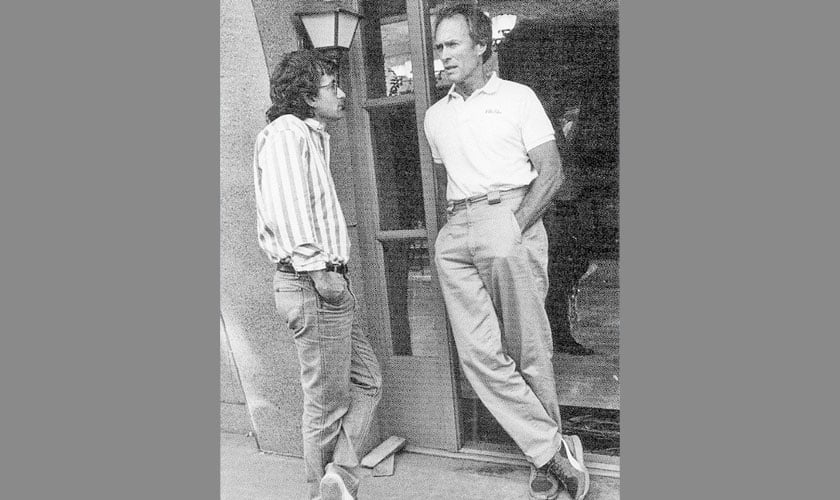Apple Inc. is betting on acclaimed director and producer Steven Spielberg for its first major foray into creating original video content. The tech giant has struck a deal with Mr. Spielberg’s Amblin Television and Universal Television, a unit of Comcast Corp.’s NBC Universal, to make new episodes of Amazing Stories, a science fiction and horror anthology series that ran on NBC in the 1980s.
ForeignEditorial
Director’s Amblin Television, NBC Universal TV production unit to make new episodes of sci-fi series from the 1980s.
By Joe Flint and Tripp Mickle
Apple Inc. is betting on acclaimed director and producer Steven Spielberg for its first major foray into creating original video content. The tech giant has struck a deal with Mr. Spielberg’s Amblin Television and Universal Television, a unit of Comcast Corp.’s NBC Universal, to make new episodes of Amazing Stories, a science fiction and horror anthology series that ran on NBC in the 1980s.
The agreement between Apple, Amblin and Universal Television calls for 10 episodes of Amazing Stories. Mr. Spielberg will likely be an executive producer for new the version of the show, which he created, people familiar with the matter said.
The budget for Amazing Stories will be significantly more than $5 million an episode, higher than most broadcast shows but on par with budgets of high-end shows on Netflix, HBO and some cable networks, according to an executive involved in the project.

Amazing Stories is the first show to be greenlit by Apple since it poached Sony Corp.’s top Hollywood television executives Zack Van Amburg and Jamie Erlicht in June to help spearhead the tech company’s push into original programming.
Apple gave the duo, who helped produce Breaking Bad, a budget of roughly $1 billion to develop original programming over the next year. They have also been tasked with building out a video strategy that is expected to include a streaming service that rivals Netflix Inc., Amazon.com Inc. and others.
NBC Entertainment President Jennifer Salke said, “We love being at the forefront of Apple’s investment in scripted programming, and can’t think of a better property than Spielberg’s beloved Amazing Stories franchise.” Also involved in the show as the day-to-day show runner is Bryan Fuller, whose credits include NBC’s Hannibal.
Apple declined to comment.
In tapping Mr. Spielberg, Apple landed an internationally renowned director with broad appeal whose lengthy list of credits includes Jaws, Raiders of the Lost Ark, E.T. and Schindler’s List. Amblin Television is headed by Justin Falvey and Darryl Frank, two well-regarded executives whose credits include such critically acclaimed shows as The Americans for FX.
Apple is betting that carving out a space in the crowded original content field can help drive subscriptions across more than 1 billion iPhones, iPads, Apple TVs and other devices world-wide.
The company will need star power to help sell subscriptions as it aims to double its services business to about $50 billion by 2020, especially after two of its early shows — Planet of the Apps and Carpool Karaoke — received critical or lukewarm reviews.
Reviving Amazing Stories could be a challenge for Apple. Recognition of the 1980s series is low among younger generations who are more likely to turn to their iPhone for video programming than a TV set.
Amazing Stories won five Emmys and was able to attract big names in front of and behind the cameras, including actors Kevin Costner and Tim Robbins, and Martin Scorsese and Clint Eastwood as directors. While the show was a critical success, it never rose above cult status and ended after two seasons.
The company faces steep competition in original programming. Netflix Inc., Amazon.com Inc. and HBO all have larger budgets and have an earlier start on programming. Apple also has to avoid jeopardizing the 15% cut of subscription revenues its app stores take in from those services, money that is a growing contributor to its services business.
The Amazing Stories deal wrapped up as news broke that Apple was dropping an Elvis Presley biopic show it planned to develop with Weinstein Co. The show had been commissioned before the arrival Mr. Van Amburg and Mr. Erlicht, who are now co-heads of video programming world-wide, at a time when Apple had been focused on producing music-themed programming to bolster its streaming-music service.
Harvey Weinstein’s removal from Weinstein Co. in the wake of numerous allegations of sexual misconduct against him activated a “key man” clause in Apple’s deal that allowed the company to pull the plug on the show, a person with knowledge of the matter said.
– Courtesy: Wall Street Journal